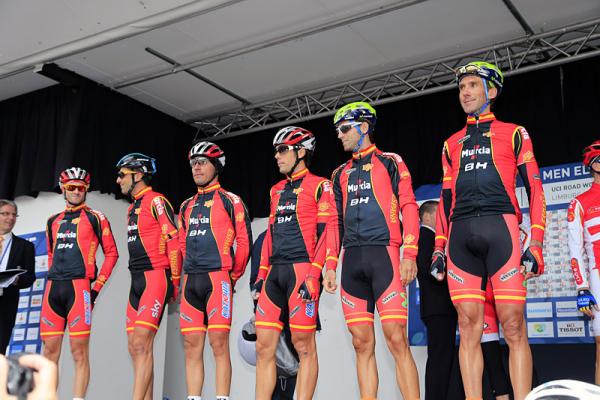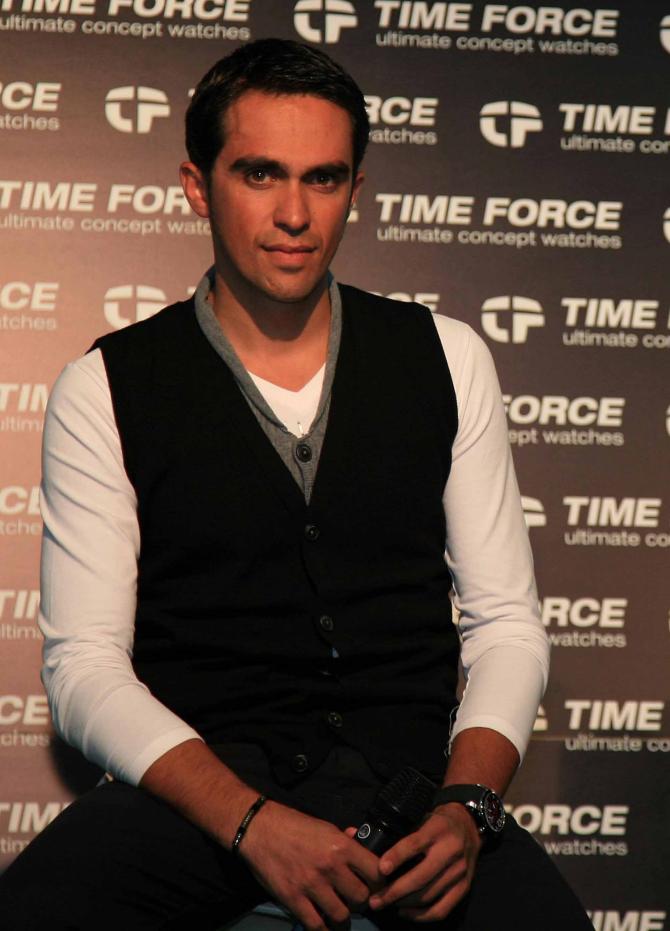New Spanish cycling federation president calls for independent anti-doping agency
López Cerron says Spanish cycling has big gap to fill between professionals and juniors


Newly-elected Spanish Cycling Federation (RFEC) president José Luis Lopez Cerron has a lot on his plate: major cuts in Spanish sport across the board, a federation with a huge debt, a big drop in the level of private and local government sponsorship of teams and races in the midst of Spain’s worst recession within living memory, the upcoming Operacion Puerto trial in January and – of course – the question of how best to tackle doping in cycling.
A former pro, López Cerron is now the organiser of one of Spain’s week-long stage races, the Vuelta a Castilla y Léon. But he is best known internationally for being the person who took Alberto Contador the infamous contaminated steak to the Astana team hotel in the Pyrenees during the 2010 Tour de France which the Spanish stage racing star says was indirectly responsible for his positive test for clenbuterol.
López Cerron recognised after his unwitting role in the affair that “it is a label which is going to stick to me for the rest of my life. For me, it’s something purely anecdotal, albeit negative because nobody likes being remembered for something like that,” he told Spanish sports daily MARCA on Wednesday.
The RFEC initially cleared Contador of any infraction, a decision which was later overturned by CAS who gave the Spaniard a two-year ban. However, as López Cerron told Cyclingnews, one of his key initiatives during his four-year mandate will be to try to hand over responsibility to a separate anti-doping body with no connection to the federation.
“I think an independent organisation should carry out those [anti-doping] tests and judge them all too,” Lopez Cerron said.
“If a federation judges their own athletes, it can produce conflicts [of interest]. An independent body would judge them in a much more neutral way, which would be better both for the federations and in terms of credibility.”
Looking at the UCI’s role in the anti-doping struggle, López Cerron says “after the Armstrong case, it’s been called into question.”
The latest race content, interviews, features, reviews and expert buying guides, direct to your inbox!
“Cycling has been one of the sports which has fought the hardest against doping, but the Armstrong case and the Contador case have both had a big impact. It’s not going to be solved overnight... and I don’t think a big change in the UCI hierarchy will change things overnight, either, or resolve any problems that arise with a particular cyclist.”
Financial problems
As for short-term goals within the RFEC, López Cerron says “The biggest problem we’ve got is financial.” The Spanish Minister of Sport estimated in October that cuts in subsidies would average just over 34 percent across all Spanish sporting federations, but López Cerron says he has been warned by sources at Spain’s Sports Council (CSD) that the cuts could be between 40 and 60 percent in some cases.
“The federation already has a big debt, and with the cuts in subsidies we’re about to have, the federation is going to face a serious economic problem. Basically, if before they’d given you two million euro, now they’re going to give you one million.
“We have to sort out that problem as best we can, look at the contracts we’ve got that can be terminated, reduce the costs as much as we can and look for investments from private companies instead of the subsidies.”
His federation also plans for what he calls “Really hard cuts in personnel, and perhaps in terms of our programs and projects for different types of cycling.”
López Cerron says he will start looking at private investment to come back into cycling again to try and fill a widening financial sponsorship gap. Broadly speaking, in Spain over the last two decades, regional government and savings banks money has softened the blow when a number of Spanish companies slowly but surely quit the sport, such as when it came to paying the tab for Euskaltel-Euskadi, Andalucia or the defunct Karpin-Galicia team, as well as numerous week-long stage races throughout Spain. Increasingly, however, that is no longer the case.
“It’s a very difficult challenge given the current situation in the country, but we’ll have to try it the best as we can.” On the plus side, the 2012 Vuelta saw a huge number of fans returning to the roadsides of the country to support their riders. Turning that nebulous enthusiasm into hard cash, though, will be a much more difficult challenge
Whilst he did not rule out Javier Minguez as a possible future trainer for the Spanish road racing team – a role vacant since Jose Luis De Santos’ resignation this autumn –the drop in budgets looks like being a bigger short-to-medium term tasks for López Cerron.
This is particularly serious given the shrinking infrastructure of Spanish amateur racing in general terms, something which indirectly led to a lack of riders at U-23 level in the World Championships – there was just one Spanish rider in the U-23 road race this year in Holland, when there are usually five or six – and to the total absence of Spanish women riders from the Olympic road race.
“The intermediate and lower levels of racing are where we have our biggest problem.
It’s relatively easy to find a ‘cycling school’ in Spain. Just in Valladolid [Lopez Cerron’s home town] Juan Carlos Dominguez [formerly of Kelme] has one with 30 kids there.”
“It’s true we’re losing teams here, but there are international squads out there and if you’re good and have a certain level, there is a chance of a job.” And as he points out Spanish riders are up there battling for victories in the Grand Tours.
“What’s the problem? The kids start growing up and we don’t have teams or races for them because of the economic situation, neither at ‘cadet’ level [14-16], nor at junior level, nor at U23.
“So that’s a problem, we’re going to end up with a situation with very few professionals, because it’s very difficult for these young people, right now, to pass up through the categories. There are so few teams and we’re losing so many races, it’s a real problem. We’re doing the best we can, but if you don’t have those lower levels, then there is no future.”
Alasdair Fotheringham has been reporting on cycling since 1991. He has covered every Tour de France since 1992 bar one, as well as numerous other bike races of all shapes and sizes, ranging from the Olympic Games in 2008 to the now sadly defunct Subida a Urkiola hill climb in Spain. As well as working for Cyclingnews, he has also written for The Independent, The Guardian, ProCycling, The Express and Reuters.
